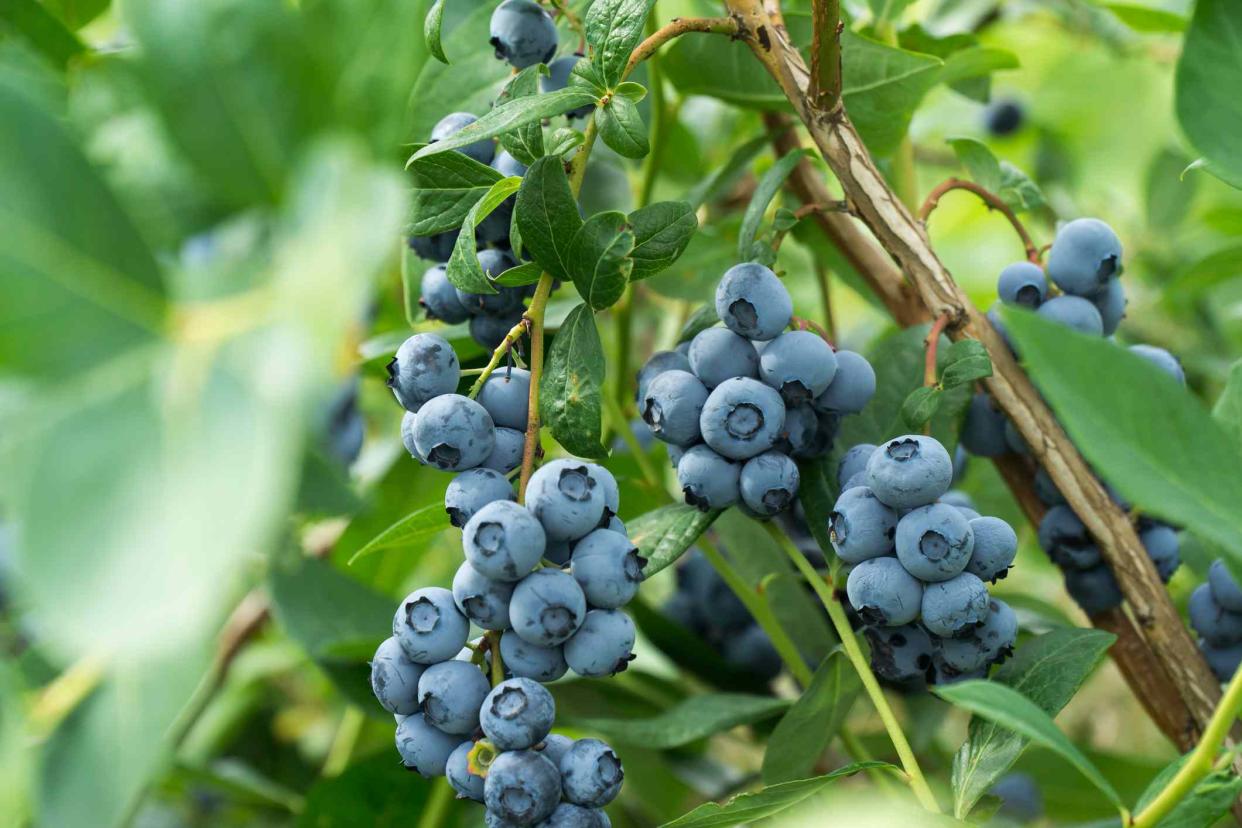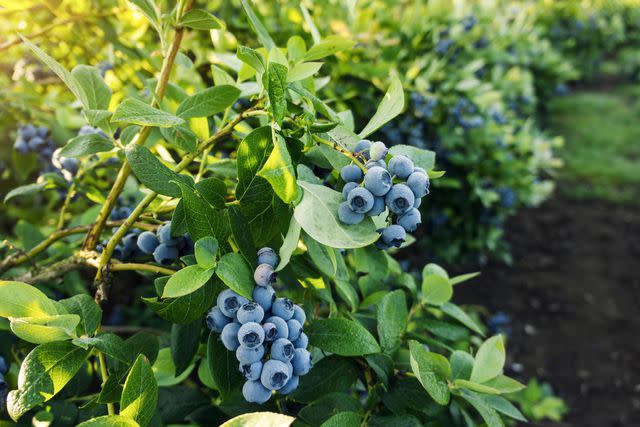This Is the Right Time to Fertilize Blueberries for Healthy Plants

Eike Leppert / Getty Images
Blueberry plants are fairly simple to grow, making them a great choice for both inexperienced and avid gardeners. However, to produce the biggest and juiciest blueberries, fertilizing with the right products at the right time is crucial.
Experts recommend fertilizing blueberry plants in early spring, and sometimes again in early summer and early fall, with an acidic, slow-release fertilizer. The appropriate fertilizer for blueberry plants will supply essential nutrients like nitrogen and maintain the correct soil pH.
Conditions for Growing Blueberries
Blueberry plants are relatively easy to grow in pots or directly in the ground and are fairly tolerant of both hot and cold weather. Nevertheless, blueberries do best in areas that are protected from high winds and receive six to eight hours of full sun. Your soil should be acidic, well-draining, and rich in organic matter, with a pH of 4.0 to 5.5.

Kativ / Getty Images
When to Fertilize Blueberry Plants
To help your blueberries access the right amount of nutrients at the right times, you should fertilize at least once a season and up to three times, based on the soil pH and plant's health. While the exact timing is flexible, experts suggest fertilizing blueberries before the plants begin producing foliage or at the first signs of foliage (generally in the early spring). Always check your the recommended application rates and timing for your specific fertilizer before adding it to your blueberry plants.
Some gardeners also fertilize blueberries in early summer, roughly six weeks later, as well as early fall, roughly one month before the first frost. However, the amount of fertilizer your blueberries require, ultimately depends on two factors: the soil pH and available nitrogen. If you notice pale leaves or minimal growth on your blueberry plants, test the soil pH to see if it's time to fertilize.
Tip
Avoid fertilizing young blueberry plants, since excessive nitrogen can damage them. Instead, wait until their second year to start fertilizing.

wihteorchid / Getty Images
How to Fertilize Blueberries
You can choose a water-soluble fertilizer for your blueberry plants, but many avid gardeners recommend an acidic, slow-release fertilizer, which comes in the form of small granules. Their solid composition allows for a gradual application of nutrients over time, which helps promote the long-term health of your blueberry plants.
Sprinkle your fertilizer granules evenly around the base of the plant and outward, as far away from the plant's main stem as its branches and leaves. Blueberry plants have fairly shallow roots, so there's no need to rake or turn over the soil after applying your fertilizer. In fact, you should avoid disturbing the soil, since doing so could inadvertently damage the plant's roots.
Once you've applied the fertilizer, some gardeners like to add a thin layer (no more than two inches) of mulch to help insulate the plant's roots. If you choose to apply a layer of mulch, we recommend a simple option like wood chips or even dried, shredded leaves.
Tip
How often you fertilize is just as important as how much fertilizer you apply. In fact, too much fertilizer can have the opposite effect, producing too many branches and foliage rather than directing those nutrients to the plant's fruit.
The Best Fertilizers for Blueberries
The best fertilizer for your blueberry plants should accomplish two primary goals: add nitrogen and acidify the soil.
As is the case with many fruit plants, nitrogen is essential to help blueberries grow plump and juicy. Nitrogen helps every part of a blueberry plant thrive, from the depth of the roots to the color of the leaves. An ammonium sulfate or elemental sulfur fertilizer can both provide nitrogen gradually and maintain a healthy soil pH.
If you'd like to solely apply nutrients, purchase an organic granular fruit fertilizer to feed your plant. Blueberry plants will generally thrive with any fertilizer designed for acid-loving plants like azaleas and rhododendrons. Be sure to test your soil pH before adding fertilizer to assess the nutrients already present in your garden and determine which is the appropriate fertilizer for your plants.
Tip
The pH of your soil impacts the plant's ability to absorb nutrients. Make sure you maintain a soil pH between 4.0 and 5.5 to help your blueberry plants thrive and prevent pests and diseases.
Read Next: 9 Best Fruit Garden Ideas to Trade for Store Bought
Read the original article on The Spruce.
